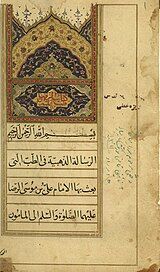Portal:Medicine/Selected Article/1
Al-Risalah al-Dhahabiah (Arabic: ٱلرِّسَالَة ٱلذَّهَبِيَّة, Arabic pronunciation: ['rɪsælætæ 'ðæhæ'biæ]; "The Golden Treatise") is a medical dissertation on health and remedies attributed to Ali ibn Musa al-Ridha (765–818), the eighth Imam of Shia Islam. He wrote this dissertation in accordance with the demand of Ma'mun, the caliph of the time. It is revered as the most precious Islamic literature in the science of medicine, and was entitled "the golden treatise" as Ma'mun had ordered it written in gold ink. The chain of narrators is said to reach Muhammad ibn Jumhoor or al-Hassan ibn Muhammad al-Nawfali who is described as "highly esteemed and trustworthy" by al-Najjashi.
The treatise of Ali al-Ridha includes scientific branches such as Anatomy, Physiology, Chemistry and Pathology when medical science was still primitive. According to the treatise, one's health is determined by four humors of blood, yellow bile, black bile and phlegm, the suitable proportion of which maintains the health. The liver plays an important role in producing and maintaining the required proportions in the body. Ali al-Ridha describes the body as a kingdom whose king is the heart while the (blood) vessels, the limbs, and the brain are the laborers. The issue of the authorship and the transmission of the text has been critically analysed in the studies by Speziale (2004) and Speziale - Giurini (2009). (Full article...)

